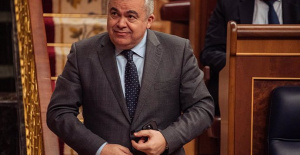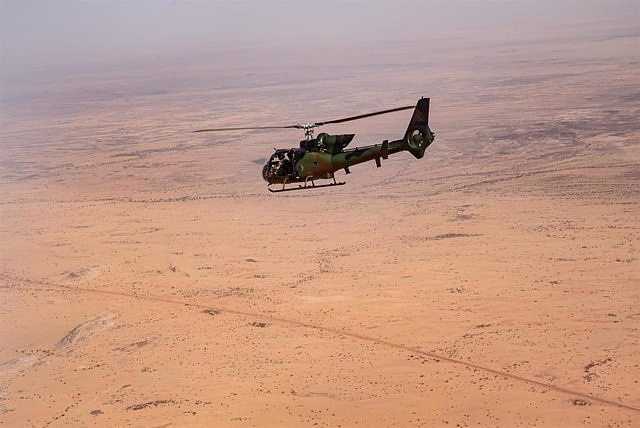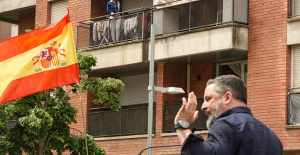Both terrorist groups strengthen positions and gain ground, which increases their threat, according to experts.
MADRID, 1 Oct. (EUROPA PRESS) -
The branches of Al Qaeda and the Islamic State that operate in Mali have seen their position reinforced after the withdrawal of French troops from the Barkhane operation and are also taking advantage of the vacuum that will be left by the UN, which has already begun to dismantle its mission in the country and must be completed before the end of the year, according to experts.
The Support Group for Islam and Muslims (JNIM) and the Islamic State Sahel (former Islamic State in the Greater Sahara, ISGS) have been able to take advantage of the vacuum left by French troops, forced to withdraw from Mali in August 2022 by the junta military that governs the country after the second coup d'état in April 2021. And now they are also trying to gain ground within the framework of the withdrawal of MINUSMA, which has already evacuated some of its bases in northern Mali.
As for the Islamic State affiliate, "in less than a year it has almost doubled its areas of control," according to the group of experts on Mali in its latest August report to the UN Security Council. The terrorist group now controls all the rural circles of the Ménaka region (northeast), and also large areas of the Ansongo circle in the Gao region (north), from where it puts pressure on other areas.
As Aaron Y. Zelin and Sarah Cahn, experts at the Washington Institute for Near East Policy, warn in an article, "the rise of the Islamic State in Mali can be directly linked to the withdrawal in August 2022 of French forces."
"At the time of the French departure, the insurgency in Mali had not been deterred or defeated, but it has undoubtedly deteriorated since then," they maintain, highlighting that the group has claimed responsibility for 26 attacks since then - in 2021 there were 14. , in 2022 a total of 29 and so far in 2023 there are already 15--.
Likewise, they warn that the departure of MINUSMA from Ménaka last August will not only leave the displaced people in this area without the help that the 'blue helmets' provided, "but much more vulnerable" to the fact that the Islamic State could end up taking over the city.
Furthermore, "the probability of greater impunity on all sides increases," they emphasize, after denouncing that in addition to attacks by terrorist groups, the civilian population is a victim of abuses by Malian troops as well as Russian mercenaries. of Wagner who support them in their fight against jihadism.
In his article 'Exploiting a vast jihad scenario. Islamic State takes territory in Mali', draw attention both to the fact that the jihadists have increased their attacks during the summer and that the terrorist group officially claimed control over the towns surrounding the city of Ménaka in May of this year.
Regarding this last issue, they highlight that like other affiliates that carried out "government functions in Syria, Iraq and Libya, the Islamic State in Mali has begun to do the same in the Ménaka region since before the takeover. April 2023". Thus, they cite the distribution of medicines and copies of the Koran but above all the deployment of their moral police, 'hisba', which has seized narcotics and has also carried out punishments such as stoning or mutilations against alleged thieves.
These structures, Zelin and Cahn emphasize, resemble those that the Islamic State used in other countries, "although they have not yet reached the maturity or bureaucratic sophistication of previous models," especially in what was once the 'caliphate'. ' in Syria and Iraq. In addition, control of territory gives jihadists access to illicit income such as cattle rustling, arms trafficking or the imposition of fees for illegal gold mining.
"Although limited in its scope or remote in its location," the fact that the Islamic State controls territories in Mali contributes to encouraging "the dream of a global 'caliphate'" although for the moment the calls from the terrorist group have been made so that combatants migrate to the Sahel does not seem to have prospered.
Likewise, experts warn that despite the current apparent "low risk" that attacks outside the Sahel can be planned from these territories, "history shows that the longer the group has a safe haven and the opportunity to expand its regime, the more capable it will be of planning operations", as already seen in Syria, Libya and Afghanistan.
Islamic State Sahel "is consolidating and expanding control in the triple border area between Burkina Faso, Mali and Niger" and the coup d'état in the latter country could generate an increase in attacks in this country, both in the west, where the group operates, as in the east, where another subsidiary, the Islamic State in West Africa (ISWA), is active in the Lake Chad basin, facilitating their interaction, warns Liam Karr, an analyst at the Critical Threats Project.
As for JNIM, the latest report from the UN committee that monitors the activities of Al Qaeda and the Islamic State, it also highlights that "it is expanding and strengthening its area of operations beyond Mali, especially to Burkina Faso".
The group commanded by Iyad ag Ghali "is suffering heavy casualties and does not seem capable of resisting the firm advances of ISGS" in the triple border area in the east. In these circumstances, the Al Qaeda affiliate has opted to reinforce its position in the center of the country, advancing towards the west and "surrounding the capital", thereby consolidating its control of the areas between Bamako and the western and southern borders.
"JNIM has increased the pace and severity of its attacks in northern Mali since early July as part of a broader effort to establish control over population centers and supply lines," Carr highlights in a recent analysis on the situation in this Sahel country.
The group is "exploiting the vacuum left by the withdrawal of UN forces", agreed at the end of June, and has quintupled attacks during July and August compared to the first half of the year. The Al Qaeda affiliate has focused its efforts mainly around the cities of Timbuktu and Gao, in an attempt to "isolate these regional capitals," the analyst emphasizes.
Furthermore, "JNIM has regularly used siege tactics to force civilians into peace agreements in central Mali," pushing local leaders to agree to "adopt aspects of Sharia law, taxation, and non-cooperation with the (Malian) security forces in exchange for the end of the siege," highlights Carr.
This would be precisely what is currently happening in Timbuktu, the historic city that the terrorist group has blocked since the beginning of August. The arrival of supplies by road has been practically interrupted while river and air communications are also interrupted following the attack on the 'Timbuktu' ferry, which occurred at the beginning of September and left more than 50 civilians dead, and the attacks on the city airport.
"JNIM's control of northern Mali could generate a threat of transnational attack," warns Carr, recalling that the Al Qaeda affiliate has already carried out attacks in the region and "the group continues to aspire to build attack capabilities against the West, despite having prioritized its insurgency at the local level in recent years.

 Exploring Cardano: Inner Workings and Advantages of this Cryptocurrency
Exploring Cardano: Inner Workings and Advantages of this Cryptocurrency Seville.- Economy.- Innova.- STSA inaugurates its new painting and sealing hangar in San Pablo, for 18 million
Seville.- Economy.- Innova.- STSA inaugurates its new painting and sealing hangar in San Pablo, for 18 million Innova.- More than 300 volunteers join the Andalucía Compromiso Digital network in one month to facilitate access to ICT
Innova.- More than 300 volunteers join the Andalucía Compromiso Digital network in one month to facilitate access to ICT Innova.-AMP.- Ayesa acquires 51% of Sadiel, which will create new technological engineering products and expand markets
Innova.-AMP.- Ayesa acquires 51% of Sadiel, which will create new technological engineering products and expand markets Felipe VI swears the flag again 40 years later at the AGM with Princess Leonor as a witness
Felipe VI swears the flag again 40 years later at the AGM with Princess Leonor as a witness Freixenet and unions agree to reduce working hours by 20-50% this year due to the drought
Freixenet and unions agree to reduce working hours by 20-50% this year due to the drought STATEMENT: Nearly 400 people participate in the II Family Support Conference at UIC Barcelona
STATEMENT: Nearly 400 people participate in the II Family Support Conference at UIC Barcelona Cerdán censures the "dirty war" of the right and calls for a debate around "democratic regeneration"
Cerdán censures the "dirty war" of the right and calls for a debate around "democratic regeneration" How Blockchain in being used to shape the future
How Blockchain in being used to shape the future Not just BTC and ETH: Here Are Some More Interesting Coins Worth Focusing on
Not just BTC and ETH: Here Are Some More Interesting Coins Worth Focusing on A sensor system obtains the fingerprint of essential oils and detects if they have been adulterated
A sensor system obtains the fingerprint of essential oils and detects if they have been adulterated Faraday UPV presents the 'Origin' rocket to exceed 10 km of flight: "It is the beginning of the journey to space"
Faraday UPV presents the 'Origin' rocket to exceed 10 km of flight: "It is the beginning of the journey to space" The Generalitat calls for aid worth 4 million to promote innovation projects in municipalities
The Generalitat calls for aid worth 4 million to promote innovation projects in municipalities UPV students design an app that helps improve the ventilation of homes in the face of high temperatures
UPV students design an app that helps improve the ventilation of homes in the face of high temperatures A million people demonstrate in France against Macron's pension reform
A million people demonstrate in France against Macron's pension reform Russia launches several missiles against "critical infrastructure" in the city of Zaporizhia
Russia launches several missiles against "critical infrastructure" in the city of Zaporizhia A "procession" remembers the dead of the Calabria shipwreck as bodies continue to wash up on the shore
A "procession" remembers the dead of the Calabria shipwreck as bodies continue to wash up on the shore Prison sentences handed down for three prominent Hong Kong pro-democracy activists
Prison sentences handed down for three prominent Hong Kong pro-democracy activists ETH continues to leave trading platforms, Ethereum balance on exchanges lowest in 3 years
ETH continues to leave trading platforms, Ethereum balance on exchanges lowest in 3 years Investors invest $450 million in Consensys, Ethereum incubator now valued at $7 billion
Investors invest $450 million in Consensys, Ethereum incubator now valued at $7 billion Alchemy Integrates Ethereum L2 Product Starknet to Enhance Web3 Scalability at a Price 100x Lower Than L1 Fees
Alchemy Integrates Ethereum L2 Product Starknet to Enhance Web3 Scalability at a Price 100x Lower Than L1 Fees Mining Report: Bitcoin's Electricity Consumption Declines by 25% in Q1 2022
Mining Report: Bitcoin's Electricity Consumption Declines by 25% in Q1 2022 Oil-to-Bitcoin Mining Firm Crusoe Energy Systems Raised $505 Million
Oil-to-Bitcoin Mining Firm Crusoe Energy Systems Raised $505 Million Microbt reveals the latest Bitcoin mining rigs -- Machines produce up to 126 TH/s with custom 5nm chip design
Microbt reveals the latest Bitcoin mining rigs -- Machines produce up to 126 TH/s with custom 5nm chip design Bitcoin's Mining Difficulty Hits a Lifetime High, With More Than 90% of BTC Supply Issued
Bitcoin's Mining Difficulty Hits a Lifetime High, With More Than 90% of BTC Supply Issued The Biggest Movers are Near, EOS, and RUNE during Friday's Selloff
The Biggest Movers are Near, EOS, and RUNE during Friday's Selloff Global Markets Spooked by a Hawkish Fed and Covid, Stocks and Crypto Gain After Musk Buys Twitter
Global Markets Spooked by a Hawkish Fed and Covid, Stocks and Crypto Gain After Musk Buys Twitter Bitso to offset carbon emissions from the Trading Platform's ERC20, ETH, and BTC Transactions
Bitso to offset carbon emissions from the Trading Platform's ERC20, ETH, and BTC Transactions Draftkings Announces 2022 College Hoops NFT Selection for March Madness
Draftkings Announces 2022 College Hoops NFT Selection for March Madness
























